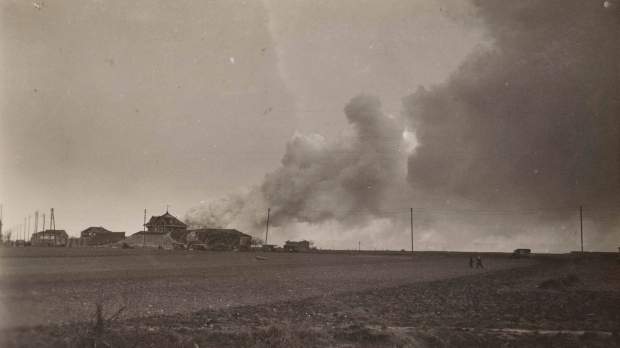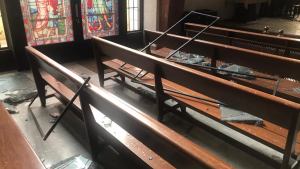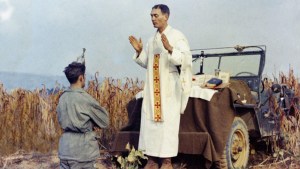Fr. Jean-Édouard Lamy (1853-1931), the parish priest of La Courneuve (just north of Paris, France) at the beginning of the last century, was an admirable figure of sanctity and has been dubbed “another Curé d’Ars” by the Archbishop of Paris. However, the centrality of the supernatural in his life has often made people forget that he was also a man of action and a committed priest.
As for his familiarity with the angelic world, it certainly harmed his reputation at a time when people no longer believed in it, even in certain ecclesiastical circles. This ability to see and hear angels was, however, often useful to him. The following anecdote, among many others, bears witness to this.
It was March 1918. The war effort was pushed to its maximum and the armament factories built in this Parisian suburb, which until then had been a market town, were working at full speed to send shells and munitions to the front of World War I every day.
At first, the population was worried about their proximity, which could attract enemy bombardments. Indeed, the Germans had long-range cannons, including the famous Big Bertha – the triumph of the Krupp steelworks – with which they were able to hit Paris. The inhabitants also feared an accident, because of the enormous stocks of gunpowder. However, they gradually got used to it, especially since these factories provided well-paid work for women who were obliged to support their families now that the men were in combat, or dead.
This apparent lack of concern didn’t change the reality of the danger; they simply chose not to think about it anymore. Except for Father Lamy. Every chance he had, he invited his flock at the parish of St. Lucien to pray the Rosary every day, in order to preserve the town from a “terrible tragedy.” Was this simple common sense, knowing that the powder magazines could blow up half the town, or a prescience from above, as some people thought, aware of the ties that the old priest had with the invisible world?
Fr. Lamy wrote:
It was at the beginning of the war … It was the Holy Angels who had spoken of the catastrophe, not the Blessed Virgin. She had given me a glimpse of the explosion and I had implored her to save the lives of the people. I said to Her: ‘Holy Mother of God, save the lives!’ And she didn’t answer, but I considered the thing granted from that moment … I did not know the day of the explosion.
On March 15, 1918, the priest seemed to have forgotten his fears and, with Easter approaching, decided to embark on a major spring cleaning. Despite his age, his very poor eyesight, and his rheumatism, Father Lamy was on all fours that morning, scrubbing the floor and thinking of going to get a ladder to clean the filthy stained glass windows.
“Go to Paris instead!”
As he cleaned, he perceived his guardian angel, along with the archangel Gabriel (they were often together), in a corner of the church watching him clean with a smile that made the priest doubt what he was doing. Gabriel said to the guardian angel, “It’s useless …”
Fr. Lamy knew that angels, unlike humans, never speak in vain, and that they must be taken seriously.
“Very often, when they want to give me good lessons, they talk together and let me hear their conversation,” he wrote. Obediently, he got up and went to put away his buckets and his soap; he would find something else to do this afternoon to beautify the church. But suddenly, he didn’t feel like doing it anymore. A strange, insistent idea came to him: “Go to Paris instead!”
What would he do there? Buy the rosaries and holy cards that he offered every year to the children who made their first communion? That errand wasn’t urgent at all, but the idea remained there, bugging him: “Go to Paris! go to Paris right now!”
It was haunting him so much that it could no longer be considered natural; someone else had to be whispering it to him. Recognizing the way guardian angels act, the priest took his coat, closed his door, and headed for the bus station. “I didn’t stay to pray for an hour, or half an hour, or even ten minutes: I went to Paris to buy souvenirs for the first communicants,” he later wrote. He boarded the bus headed towards the capital.
As soon as the bus started, a terrible explosion shook the whole neighborhood with a terrifying noise, shattering all the windows for miles around – starting with the windows of St. Lucien’s church that he had wanted to clean that morning. The Sohier armament factory had just blown up, and dozens of buildings and houses with it!
Protected by angels
Shaking with emotion, Father Lamy got off the bus and contemplated, appalled at what remained of his church, whose central nave had collapsed. If the elderly priest had followed his plan, he would be there, buried under the rubble, at the foot of the tabernacle in front of which he usually prayed at that hour. He would be dead, no doubt, along with many victims of this catastrophe. As for the Eucharist reserved in the tabernacle, which was his immediate preoccupation, it was miraculously intact. Although the tabernacle had been blown out of the wall, the ciborium and the corporal it rested on were still in place, floating in the hole in the wall left by the tabernacle.
Fr. Lamy understood why he had been given this miraculous warning and had survived. If he were lying under the rubble, there would be no priest to go to give absolution and attend to the other spiritual needs of the victims that the rescue workers were beginning to dig out of the rubble. The salvation of all these unfortunate people depended on his survival.
For hours on end, in the midst of the rubble and the toxic fumes that suffocated him, the parish priest of St. Lucien – forgetting himself for the sake of others – took care of the wounded. There were more than 900 people injured.
In the evening, exhausted, he noticed that, as the angels and Our Lady had promised him when they announced the catastrophe, no one had been killed. They had been protected by the Rosary, the holy angels, and the faith of their old priest.



